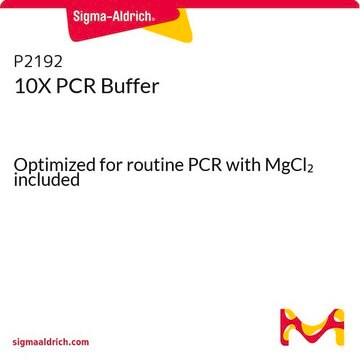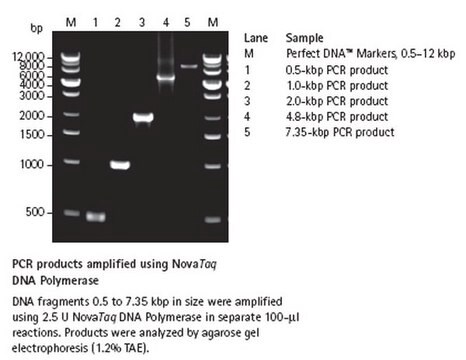TAQ-RO
Roche
Taq DNA Polymerase, 5 U/μl
optimum pH ~9.0 (20 °C), optimum reaction temp. 72 °C
Synonym(s):
dna amplification, pcr, polymerase, pcr, primer extension, dna amplification, primer extension
About This Item
Recommended Products
biological source
bacterial (Thermus aquaticus)
Quality Level
recombinant
expressed in E. coli
grade
Molecular Biology
form
liquid
usage
sufficient for ≤1,000 reactions (11146173001)
sufficient for ≤10,000 reactions (11435094001)
sufficient for ≤2,000 reactions (11418432001)
sufficient for ≤5,000 reactions (11596594001)
sufficient for ≤200 reactions (11146165001)
specific activity
5 U/μL
mol wt
95 kDa
packaging
pkg of 1,000 U (11418432001 [4 x 250 U])
pkg of 2,500 U (11596594001 [10 x 250 U])
pkg of 5,000 U (11435094001 [20 x 250 U])
pkg of 100 U (11146165001)
pkg of 500 U (11146173001 [1 x 500 U])
manufacturer/tradename
Roche
parameter
72 °C optimum reaction temp.
technique(s)
DNA sequencing: suitable
PCR: suitable
color
colorless
optimum pH
~9.0 (20 °C)
solubility
water: miscible
suitability
suitable for molecular biology
NCBI accession no.
UniProt accession no.
application(s)
genomic analysis
life science and biopharma
foreign activity
Nicking activity 30 units, none detected
Ribonuclease 30 units, none detected
Unspecific endonucleases 30 units, none detected
storage temp.
−20°C
Related Categories
General description
Taq DNA Polymerase was originally isolated from the thermophilic eubacterium Thermus aquaticus BM, a strain lacking Taq I restriction endonuclease. The enzyme was cloned in E.coli.
Application
- PCR
- RT-PCR
- qPCR
- Other primer-extension reactions, such as sequencing and labeling
Features and Benefits
High lot-to-lot consistency.
No need to test each lot:
Taq DNA Polymerase is rigorously tested.
Prevent PCR carryover:
dUTP incorporation combination with Uracil-DNA Glycosylase prevents PCR cross-contamination.
Packaging
Quality
Lack of restriction endonuclease:
The enzyme originally isolated from T. aquaticus BM lacks Taq I restriction endonuclease activity.Each lot is PCR tested using λDNA. Each lot is also tested for the absence of exo- and endonucleases, and nicking activities according to the current Quality Control procedures.
Unit Definition
Unit Assay: Incubation buffer:
67 mM Tris/HCl; pH 8.3/25 °C, 5 mM MgCl2, 10 mM Mercaptoethanol, 0.2% Polydocanol, 0.2 mg/ml Gelatine, 0.2 mM each dATP, dGTP, dTTP and 0.1 mM dCTP.
Incubation procedure:
M13mp9ss, M13 primer (17mer) and 1 μCi (α-32P) dCTP are incubated with suitable dilutions of Taq DNA Polymerase in 50 μl incubation buffer at +65 °C for 60 minutes. The amount of incorporated dNTPs is determined by trichloroacetic acid precipitation.
Volume Activity: 5 U/μl
Other Notes
Legal Information
Kit Components Only
- Taq DNA Polymerase 5 U/μl
- PCR Buffer with MgCl<sub>2</sub> 10x concentrated
- MgCl<sub>2</sub> Stock Solution
- PCR Buffer without MgCl<sub>2</sub>
Hazard Statements
Precautionary Statements
Hazard Classifications
Aquatic Chronic 3
Storage Class Code
12 - Non Combustible Liquids
WGK
WGK 2
Flash Point(F)
does not flash
Flash Point(C)
does not flash
Certificates of Analysis (COA)
Search for Certificates of Analysis (COA) by entering the products Lot/Batch Number. Lot and Batch Numbers can be found on a product’s label following the words ‘Lot’ or ‘Batch’.
Already Own This Product?
Find documentation for the products that you have recently purchased in the Document Library.
Customers Also Viewed
Our team of scientists has experience in all areas of research including Life Science, Material Science, Chemical Synthesis, Chromatography, Analytical and many others.
Contact Technical Service











